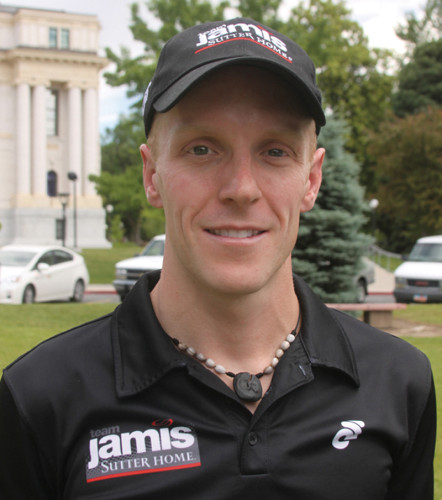By Tyler Wren — To me, the primary purpose of the bicycle is transportation, in its purest, cleanest, and most efficient form. Through the sport of cycling, we get to pedal great distances through cities, and over mountains, winning the battle against gravity and resistance. However, my profession as a professional cyclist is ironically one of the most difficult to commute to by bike. I spend a lot of my time in airplanes and my team van, flying and driving all over the world to get the chance to compete on my bike with other cyclists. This dichotomy of my bike, a clean and our most efficient self-powered mode of transportation, and my dirty, inefficient travel to races, has prompted me to start a ‘green’ campaign this year and lessen my cycling carbon footprint.
 Raised in suburban Philadelphia, I was instilled with the importance of a low-impact lifestyle. My parents generate their own electricity with solar panels, grow their own fruits and vegetables in their garden, and tend a chicken coop. So this year, I am striving to practice and promote these principles in my professional cycling career. For one, I am offsetting all of the CO2 emissions that my race-related travel generates by supporting carbon-reducing projects via CarbonFund.org.
Raised in suburban Philadelphia, I was instilled with the importance of a low-impact lifestyle. My parents generate their own electricity with solar panels, grow their own fruits and vegetables in their garden, and tend a chicken coop. So this year, I am striving to practice and promote these principles in my professional cycling career. For one, I am offsetting all of the CO2 emissions that my race-related travel generates by supporting carbon-reducing projects via CarbonFund.org.
The average American generates about 10 tons of CO2 directly through their home, car, and travel, and another 23 tons through the economy, buying clothes, food, and other goods and services. With those staggering numbers in mind, here are a few other ways that I have committed to reducing my impact in both these areas: using my bicycle or motorcycle for transportation instead of my car whenever possible; spending a few extra dollars to buy local produce (much of our grocery stores’ produce is shipped from all around the world, creating a needlessly large carbon footprint); using reusable bags for shopping; turning off lights and unplugging electronics when not in use (even when an electronic device is turned off, it still uses a small amount energy when plugged in); recycling as much as possible (which sometimes means a trip to the recycling station at the mouth of Emigration Canyon).
We are lucky to be living in such a bike-friendly area. Mayor Becker, a cyclist himself, has done a lot of work in Salt Lake City advocating for cyclists, raising awareness of our presence on the road, and installing bike paths and bike lanes throughout the city. I feel thankful for that and encouraged by the amount of bike commuters I see on the roads each week. Guessing at how much time I sit idling at stop lights downtown when I do need to drive around town, I know that collectively the bike commuters make a huge difference in our valley’s air quality and overall impact on our environment, so I applaud your efforts and wish that I could count myself as a bike commuter in my profession.
I know that in general, cyclists are some of the most environmentally conscious citizens of Utah, so I hope I was able to get you thinking about how much of a positive impact a bicycle and thinking green can have on our beautiful landscape. You can track my carbon offsets this season on my website, TylerWren.com. Thanks for reading, and see you out on the bike lanes!
Tyler Wren is a professional cyclist for the Jamis/Sutter Home Professional Men’s Cycling Team living in downtown Salt Lake City. He also coaches athletes and is available for cyclocross and road cycling clinics. To find out more information, contact Tyler at [email protected] or 610-574-1334.






